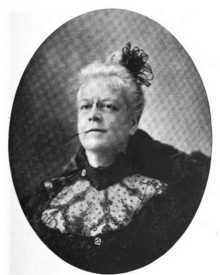Isabel F. Hapgood
| Isabel Florence Hapgood | |
|---|---|

Isabel F. Hapgood, from a 1906 publication
|
|
| Born |
November 21, 1851 Boston, Massachusetts, United States |
| Died | June 26, 1928 (aged 76) New York City, United States |
Isabel Florence Hapgood (November 21, 1851 – June 26, 1928) was an American ecumenist, writer and translator, especially of Russian and French texts.
Hapgood was born in Boston, to Asa Hapgood and Lydia Anna Bronson Crossley, with her twin brother Asa. Their parents later had another son, William Frank Hapgood (who became a patent lawyer). Asa Hapgood was an inventor, and his family of English and Scottish descent had lived near Worcester, Massachusetts since the 17th century. Her mother's father had emigrated from England and owned a farm in Mason County, Kentucky. While Asa was sent to Harvard University, which did not accept women (and ultimately went into the paper business), Isabel attended Worcester's Collegiate Institute between 1863 and 1865, then transferred to Miss Porter's School in Farmington, Connecticut. She graduated in 1868, the year her father died. Hapgood showed considerable language abilities, mastering many Romance and Germanic as well as Slavic languages, including Russian, Polish and Church Slavonic.
Hapgood became a major translator of French and Russian literature, as well as a key figure in the dialogue between Western Christianity and Orthodoxy. She helped Harvard professor Francis James Child with his Book of Ballads which began publication in 1882. In 1885 Hapgood published her own Epic Songs of Russia, for which Child supplied a preface, and which received several good reviews. The next year Hapgood published translations of Leo Tolstoy’s Childhood, Boyhood, Youth and Nikolay Gogol’s Taras Bulba and Dead Souls. In 1887 her translations of the major works of Victor Hugo began publication, introducing that major French author to American audiences.
...
Wikipedia
